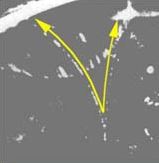
|
|

|
|
`Abdu'l-Bahá must have kept in touch with the popular accounts of science in his time, at least occasionally. For instance, he was aware of Maxwell's aether hypothesis:
... the nature of ether is unknown, but that it existeth is certain by the effects it produceth, heat, light and electricity being the waves thereof. By these waves the existence of ether is thus proven.
—Bahá'í World Faith; Tablet to August ForelIf we wish to deny everything that is not sensible, then we must deny the realities which unquestionably exist. For example, ethereal matter is not sensible, though it has an undoubted existence. The power of attraction is not sensible, though it certainly exists. From what do we affirm these existences? From their signs. Thus this light is the vibration of that ethereal matter, and from this vibration we infer the existence of ether.
—Some Answered Questions, pg. 190
Of course this logic was rejected by Albert Einstein, who pointed out that Maxwell's equations were the only explanation necessary for electromagnetism (including light). The aether was an unnecessary concept. The only reason that Maxwell ever invoked the concept was so that electromagnetic radiation would not propagate in a void. Why did he need an aether? Because he needed a mechanistic medium for electromagnetic radiation to propagate through. Einstein rejected this mechanistic thinking because (1) it was superfluous and scientifically useless, and (2) it contradicted the principle of relativity and the experimental evidence thereof.
`Abdu'l-Bahá was limited by classical mechanistic thinking, even though he lived in Einstein's time. Of course `Abdu'l-Bahá wasn't really "thinking" in a creative sense; he was simply mimicking a defunct scientific argument that had been made a half century before, as a means to his metaphysical end.
The aether was not the only example of `Abdu'l-Bahá's outmoded mechanistic thinking. Here's another:
Scientific philosophy has demonstrated that a simple element (`simple' meaning `not composed') is indestructible, eternal. The soul, not being a composition of elements, is, in character, as a simple element, and therefore cannot cease to exist.
- Paris Talks
Physics may yet discover a truly fundamental particle, but the atoms that `Abdu'l-Bahá refers to are continually destroyed, not only in Nuclear bombs and power plants, but in natural radioactive decay. Not long after the discovery of radiation, Einstein described that any matter can be transformed into energy.
It followed from the special theory of relativity that mass and energy are both but different manifestations of the same thing -- a somewhat unfamilar conception for the average mind. Furthermore, the equation E is equal to m c-squared, in which energy is put equal to mass, multiplied by the square of the velocity of light, showed that very small amounts of mass may be converted into a very large amount of energy and vice versa. The mass and energy were in fact equivalent, according to the formula mentioned before. This was demonstrated by Cockcroft and Walton in 1932, experimentally.
- Albert Einstein
After several Nobel Prizes had been awarded for these breakthroughs, `Abdu'l-Bahá was still thinking in terms of the science of the previous century.
Bahá'�s respond in different ways to this problem. Some say that `Abdu'l-Bahá was not infallible regarding matters of science, and claim that he never claimed to be. These Bahá'�s fail to recognize the obvious. `Abdu'l-Bahá almost always spoke as an absolute authority on matters of science; he spoke with absolute conviction that he was correct with respect to the facts. Shoghi Effendi reaffirms his grandfather's confidence, while addressing some controversial claims to historical knowledge made by `Abdu'l-Bahá:
Historians cannot be sure Socrates did not visit the Holy Land. But believing as we do that `Abdu'l-Bahá had an intuitive knowledge quite different from our own, we accept His authority on this matter....
- Shoghi Effendi, Arohanui (1946)
I can't quite see what a special "intuitive knowledge" would have to do with knowing whether Socrates visited Israel and learned about God from rabbis. That's not intuition, but something nearer to omniscience.
Notwithstanding this "official" pronouncement of his infallibility, there is an unofficial account of `Abdu'l-Bahá denying such infallibility. Nevertheless, `Abdu'l-Bahá spoke with unshakable confidence on these matters, so there is ample implicit evidence that he wanted to give the impression that he was indeed infallible.
Some hope that Einstein and modern physics are somehow mistaken, and hence follow every pseudoscientist that claims to have evidence thereof. Some Bahá'�s claim that `Abdu'l-Bahá was speaking metaphorically, but fail to present a metaphor.
Infallibility, especially when applied to the real world of science and history, is a dead-end street.